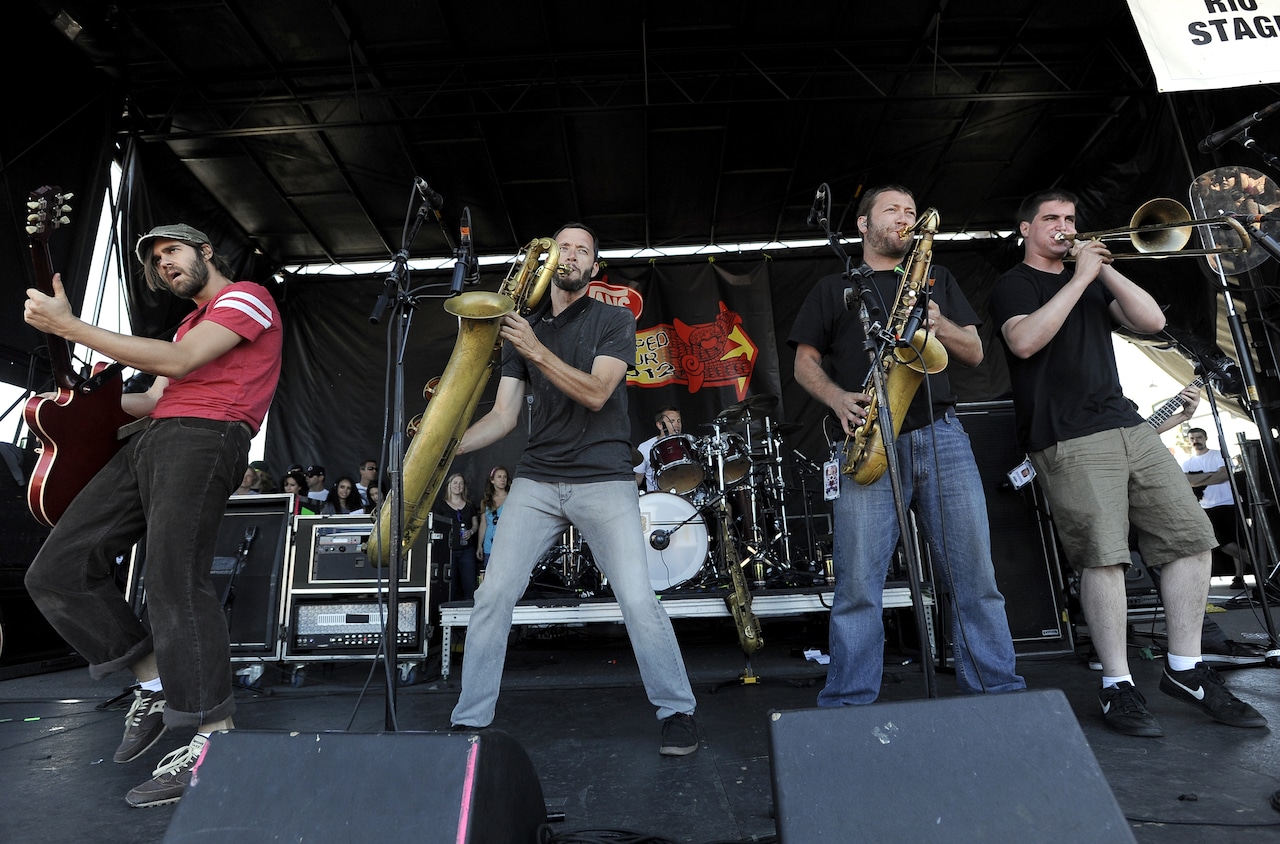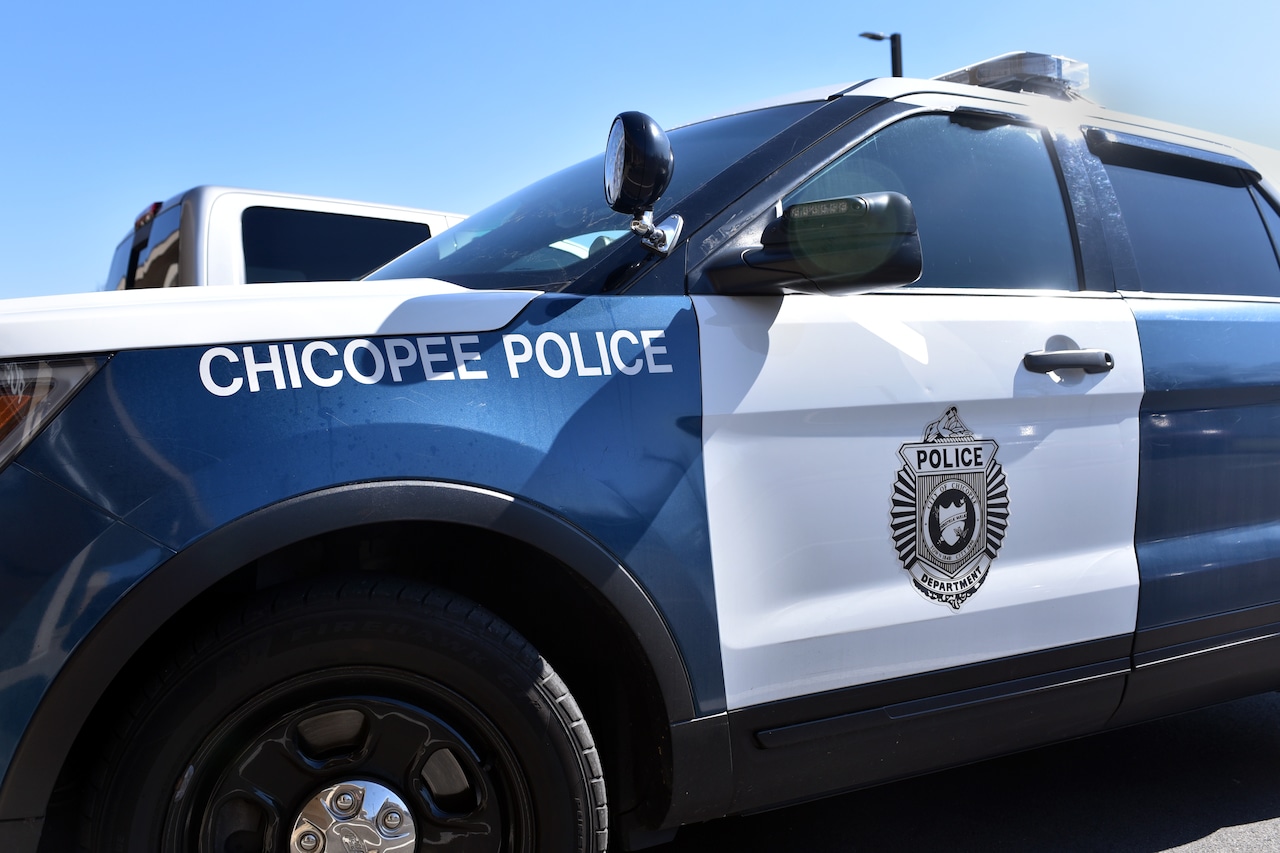The path to success for Firebrand Cannabis, a marijuana dispensary that opened last month across from Boston’s South Station, is based on two key assumptions.
The first concerns its location: Tens of thousands of travelers pass through New England’s largest commuter hub daily. Firebrand’s owners are betting that enough of them will want to grab a joint or pack of gummies before catching their train or bus.
The second gamble is on Firebrand’s unique ownership structure, which the proprietors think is the first of its kind in the seven-and-a-half years since Massachusetts voters legalized recreational cannabis.
The Atlantic Avenue pot shop has six principal owners. A four-person majority consists of members of the state’s cannabis social equity program, which helps business owners from communities most affected by the former marijuana prohibition break into the now-legal industry.
One of the owners, Michael Ortoll, entered the “legacy market” — what some people call the illicit marijuana industry — when he started selling joints in middle school. By the mid-1990s, he was running two cannabis delivery services in New York City.
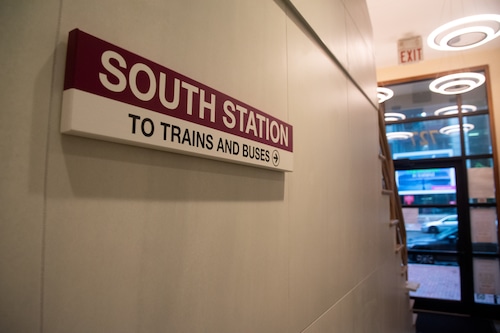
Firebrand Cannabis dispensary opened in May at 727 Atlantic Ave. in Boston, across from South Station.Will Katcher/MassLive
Ortoll’s ride ended with his arrest in Texas with a trunkload of marijuana and subsequent conviction. He says he has a keen understanding of the cannabis industry and its customers but is now learning the intricacies of running a business above board.
“I’m the outlaw,” Ortoll joked. “My legacy market (experience) is the knowledge of the product and what customers like and don’t like. Thirty years in the legacy market, it’s like a second sense.”
The company’s two non-social equity owners are well-versed in the state’s maturing cannabis industry and the labyrinth of regulations that govern it.
Businessman David Rabinovitz helped teach the state’s first cohorts of social equity program participants the ins and outs of operating a cannabis business in Massachusetts. Blake Mensing is an attorney who represented cannabis companies across the state before selling his legal practice last year.
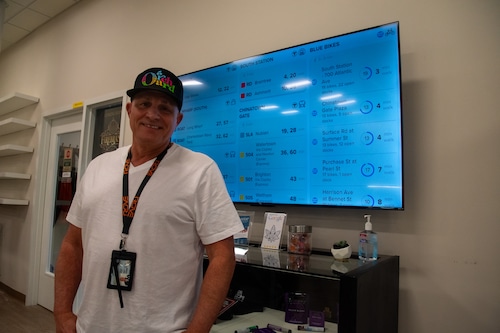
Michael Ortoll, a social equity program participant and co-owner of Firebrand Cannabis, a dispensary located at 727 Atlantic Ave. in Boston, across from South Station.Will Katcher/MassLive
State officials created the social equity program and a separate economic empowerment program to provide a leg up to entrepreneurs from communities most affected by the so-called war on drugs, the decades-long policies of strict drug enforcement that led to the imprisonment of millions, including disproportionate numbers of Black and Latino Americans.
The state has taken steps to inject money into the social equity business through a grant program funded by marijuana tax revenue. It distributed more than $2 million for the first time earlier this year and could dispense another $27 million in the coming months.
However, some program participants and advocates say it has still been difficult for those entrepreneurs to open and grow marijuana businesses. Among the chief complaints is that many social equity participants lack the funds to kickstart their businesses in an industry noted for its steep startup costs.
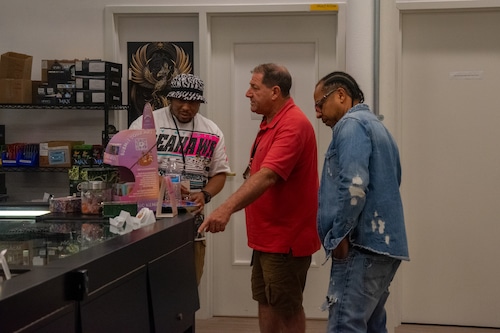
(Left to right) Trey Williams, David Rabinovitz and Albie Montgomery, three of the six co-owners of the recently opened Firebrand Cannabis, a dispensary located at 727 Atlantic Ave. in Boston, across from South Station.Will Katcher/MassLive
Firebrand is structured so Mensing and Rabinovitz, together with outside investors, own a minority of the company. The four social equity program participants — Ortoll, Trey Williams, Desiree Franjul and Albie Montgomery — collectively hold the majority.
When the company’s six board members vote on critical business decisions, any ties go to the side with the majority of the social equity owners.
‘How we make equity right’
Mensing and Rabinovitz want their co-owners to have the opportunity to build their own successful cannabis companies independent of the business they are involved in now.
Ortoll aside, the Firebrand social equity owners did not have experience selling cannabis, Mensing said. At the dispensary, they are learning directly what it takes to run a marijuana company — managing employees, sourcing products from vendors, navigating the state’s rigid regulations, selling to customers and more.
“All the owners are here,” Franjul said. “We’re not behind the scenes.”
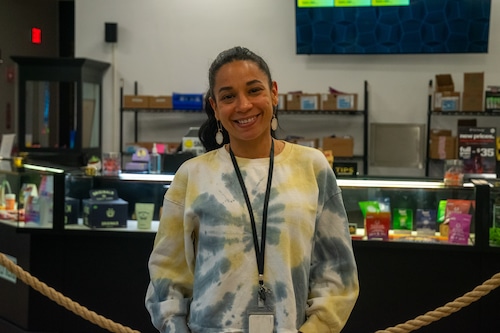
Desiree Franjul, a social equity program participant and co-owner of Firebrand Cannabis, a dispensary located at 727 Atlantic Ave. in Boston, across from South Station.Will Katcher/MassLive
Montgomery called the experience “priceless.”
“I think this idea is not just great for cannabis but great for a lot of industries,” he said. “There’s a lot of industries that could use this process and say, ‘Hey this is how we make equity right within the country.’ I think it’s an amazing model.”
When Mensing worked as an attorney, helping more than 100 clients secure cannabis business licenses, he saw investors frequently pose some form of the same question to social equity program business owners: “How do I know you can do this?”
“They’ll be able to say, ‘I can do it because I’ve been doing it,’” Mensing said. “We want them to gain experience.”
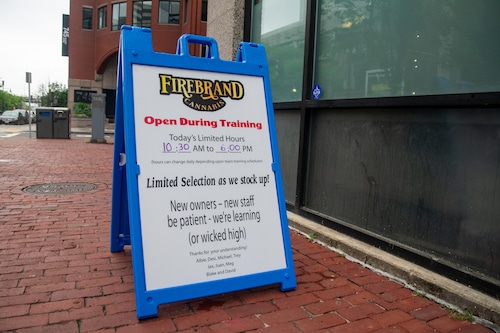
A sign outside Firebrand Cannabis, a recently opened dispensary located at 727 Atlantic Ave. in Boston, across from South Station.Will Katcher/MassLive
Ortoll said he is now working to open a dispensary in Porter Square, on the border between Cambridge and Somerville.
Franjul, who previously worked on community outreach for the Boston dispensary chain High Profile x Budega, dreams of creating and selling cannabis edibles that are healthier than the gummies, chocolates and baked goods that currently dominate the market.
She said other employees of Firebrand also have grand dreams of breaking into the industry on their own.
“We have one employee who wants to open his own cannabis store,” Franjul said. “If that means someday he’ll leave here and go open up, that’s great. That’s success.”
Is South Station an untapped market?
With more than 350 cannabis shops operating across the state, including about 30 in Boston, competition can be fierce.
But Firebrand appears to have found an island devoid of nearby competitors across from South Station, within a short walk of Downtown Crossing, the Financial District, Chinatown and the Seaport district.
The owners went after the Atlantic Avenue location before they knew about the 51-story skyscraper under construction above South Station, Mensing said. The mixed-use building could invite a flood of new residents and commuters to the neighborhood.
Ortoll sees a diverse customer base in the area: blue-collar and white-collar, construction workers from the South Station Tower, businesspeople from the Financial District and tourists and travelers passing through South Station.
Since opening in May, Mensing estimated half of the shop’s customers have come in carrying luggage.
“We are thrilled to be in this neck of the woods,” Mensing said.
Aware that some of their customers may be in a hurry to make a bus or train, Mensing and the other owners installed a television on the shop’s wall displaying a live feed of South Station’s departures schedule.
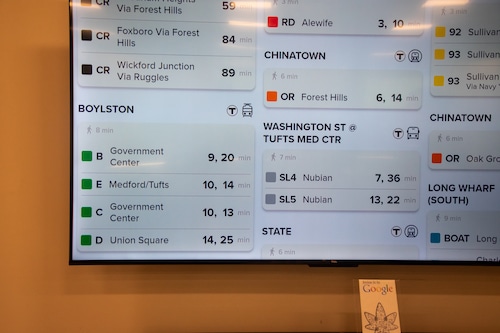
Firebrand Cannabis dispensary is located at 727 Atlantic Ave. in Boston, across from South Station. A TV on the wall displays a live feed of the station’s departure schedule.Will Katcher/MassLive
“The whole model is to get you in, get you out, get you on your train,” Mensing said.
“Ninety-one thousand people go through South Station every day,” he said. “That number is going to go up. It’s the busiest transportation hub in New England and we think it’s the right place to be.”



